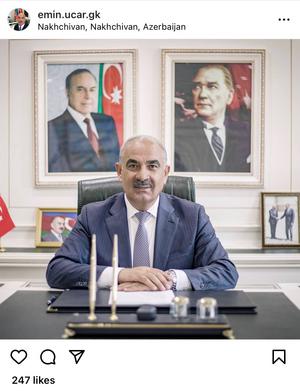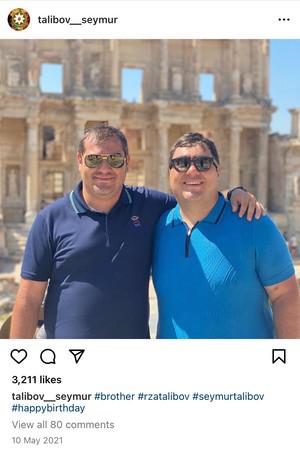Turkish entrepreneur Emin Uchar made his fortune in the Nakhichevan Autonomous Republic, an Azerbaijani exclave that borders Iran, Turkey and Armenia. New documents and evidence indicate he may have been a family confidant Vasif Talibovwho ruled the region for 27 years, and left the post on December 21, 2022.
In Tbilisi, opposite the Opera House, there is a restaurant called Dinehall, whose motto is: “Good food is an inalienable human right.” Nearby, with the support of Accor, the French hospitality giant, a five-star hotel is being built.
Both the hotel and the restaurant are part of the Georgian business empire of Turkish citizen Emin Uchar – officially, anyway. But OCCRP has found evidence that Uchar likely represented the family of Vasif Talibov, who ruled the Azerbaijani exclave for 27 years before abruptly resigning on December 21, 2022.
Through a lawyer, Uchar stated that his company did not own the assets of the Talybovs, and he made his fortune thanks to loans. Accor told OCCRP that the company had decided to reconsider its partnership with Uchar and his company in light of their possible connection to the Talybovs.

Vasif Talibov has ruled the Nakhichevan Autonomous Republic (NAR), often referred to as “Azerbaijani North Korea”, since December 1995, when he was appointed to the post by the then president of the country, Heydar Aliyev, his relative by marriage.
The exclave within Azerbaijan is separated from the country by the lands of Armenia, and in the west it borders on Iran.
In February 2022, OCCRP spoke about Uchar’s connections with the Talybov family, under whose control independent media were suppressed in Nakhchivan, dissidents were placed in psychiatric hospitals, and detainees were beaten and tortured. Journalists found out that during the years of power, Talybov amassed a huge fortune, although his official salary was only 26 thousand dollars a year.
OCCRP has found new evidence that many of the Talybovs’ assets were likely hidden behind the Uchar group of companies, which owns hotels and other real estate in Georgia, as well as a building materials company in Turkey.
The first enterprises of this corporate network were registered in the early 2000s. Since then, the holding, which is called Gamigaya in Azerbaijan and Maqro Group in Georgia, concluded dozens of state contracts in Azerbaijan.
But over the past few weeks, the Talybovs’ wealth appears to have dwindled significantly, with the head of the family stepping down as regional leader amid crackdowns by the Azerbaijani government.
It is unclear who owns the Gamigaya. A week after Talybov’s resignation, the holding was renamed Arkoz, the same name as another company associated with Uchar.
Human rights organizations have long speculated that the Talibovs control Gamigaya, but information about the owners of companies in Azerbaijan is not publicly available, so proving these assumptions was almost impossible. But a former Gamigaya security official told OCCRP that he saw Uchar following the Talybovs’ instructions.
“They just put him in charge of Gamigaya Holding. Everything was done at the direction of Vasif Talibov,” Nadir Mammadov said in a video call from Germany, where he left the NAR after he was beaten by the police.
Recently discovered documents indicate that Uchar represented the interests of the Talybovs in neighboring Georgia. There he bought real estate on behalf of Rza Talybov, the son of the former head of the Nakhichevan Republic, and in addition, they jointly owned several companies.

Rza did not respond to reporters’ questions, and a lawyer from Uchar’s Maqro company and a lawyer for Seymour, Talybov’s youngest son, made conflicting statements about the business relationship between Uchar and the family.
Seymour’s lawyer said that Rza Talybov and Uchar are “co-owners of different companies called Gamigaya in Nakhichevan.” From this we can conclude that cooperation continues.
But Maqro and Uchar’s lawyer said they “unreservedly reject this claim.”
“To date, Mr. Emin Uchar has no business ties with anyone from the Talybov family,” the lawyer said.
He added that Uchar had previously collaborated with Rza Talybov, but decided to end this relationship during a “reorganization process” that began at the end of 2021. According to him, the process accelerated when, in February 2022, OCCRP released an article about the Talybovs.
He said that “to prove cooperation with any document dated late 2022” is impossible.
Since 2012, the law on “commercial secrets” has been in force in Azerbaijan, which means that information about the shareholders of enterprises is not available to journalists and citizens. According to the lawyer, because of this law, he is not entitled to disclose details about the structure of the companies that Uchar and Talybov jointly managed.
The lawyer said that Ucar never acted as a trustee “in anyone’s business other than his own, neither in the past nor in the present” and always acted in accordance with the law.
He added that the source of funds for the various investments mentioned by OCCRP were loans from banks, and Ucar is still paying them back.
Evolution of Uchar
In 2010, the Turkish media wrote about Uchar that “Vasif Talibov trusts him immensely.” But little is known about how he got into the business and how he made his apparently huge fortune.
As told in one of the Turkish mediaEmin Uchar started construction in Nakhichevan in 1999.
Turkish corporate documents state that in 2001, Ucar co-founded a wholesale trading company. In 2004, his name was mentioned in Azerbaijani state media in connection with the fact that a “Turkish company” was building a school in Nakhichevan. In 2005, he received the Progress medal from President Ilham Aliyev. This award is presented to “entrepreneurs who have distinguished themselves in the implementation of the program of social development of the regions of Azerbaijan.”
According to corporate documents, Uchar first became an official partner of the Talybovs as part of the group behind Nakhichevan Bank, which was founded in April 2008.
Rza Talybov, his mother and cousin, as well as a number of other entrepreneurs, took part in the deal. According to annual reports, by the end of 2017, most of the bank’s shares belonged to members of the Talybov family, while Uchar had no share. Authorities recently began cracking down on the family, and on January 12, Talybov’s daughter Baharkhanum was expelled from the bank’s board of directors.
Maqro’s lawyer confirmed that Uchar “for some time owned a small percentage of Nakhichevan Bank’s shares” but then left the company. According to the lawyer, the entrepreneur “did not sell his share to anyone, but simply refused it” and “received property of the corresponding value in exchange for shares.”
In 2009, Uchar co-founded another company called Gemikaya Tourism. And in the same year he opened the Blue Regency Hotel in Turkish Bakirkoy. In 2019, with the support of Accor, the hotel was turned into a four-star Mercure İstanbul Bakırköy.
OCCRP staff found a document that directly refers to the connection between Uchar and the Talybovs. It turns out that Uchar went to Batumi to sign a contract of sale on behalf of Rza.
“I trust him to buy any property in my name in the city of Batumi in Georgia,” says Rza’s power of attorney issued to Uchar for a period of one month, effective February 21, 2012.
In June of the same year, Rza issued a new power of attorney to Uchar, this time for two months. He bought over $1.2 million worth of real estate in the neighborhood of an old building, and Uchar signed the documents as his representative.
“The purchase of real estate by proxy from Mr. Rza Talybov refers to the period when they were business partners,” Maqro’s head of legal department said in an email. He added that it is “completely normal for one partner to turn to the other for help in such matters.”
A month after the deal, a ceremony was held to start construction on the site. The media reported that the work was carried out by the Azerbaijani conglomerate Gamigaya, whose name they wrote as Gemikaya, and Rza was captured in photographs from the event, although his name was not indicated.
Two years later, in 2014, a five-star Divan Suites Batumi hotel opened in buildings bought by Rza. Rza published photograph from the opening ceremony on Facebook and called himself the chairman of Gamigaya Holding, which contradicts the reports of the Azerbaijani media, which called the chairman of the Uchar group of companies.
Judging by the documents from Georgia, at first Rza owned the property personally. Corporate documents show that in 2014, when the hotel opened, Rza transferred ownership to his local company, Kervan Tourism Ltd. But until 2017, the hotel was listed as an asset on the Gamigaya website, proving Rza’s connection to the company.
When did Talybov fell into disgrace from the central authorities and eventually lost his post on December 21, Rza put Divan Suites up for sale for $18 million.
Maqro in Georgia
The first enterprise within Gamigaya opened in Georgia in 2012, it was a furniture factory in Batumi. In 2013, the company operating in the country was renamed Maqro, it worked in various fields, including construction, catering and tourism.
From 2012 to 2016, Maqro bought $27 million worth of real estate – just at that time, Uchar and Rza were doing a joint business. This is further evidence that Maqro’s investments in Georgia are linked to the Talybovs.
Maqro said it had invested $270 million in the development of these and two other Georgian projects.
Maqro owns Green Budapest, a residential complex with 350 mid-range apartments near the center of Tbilisi. A little further from downtown, the Green Diamond is being built, a larger $120 million project.
Together with Accor, Maqro is preparing to open Swissôtel, and in the Old City of Tbilisi, the companies have two more hotels: Mercure, which opened in 2015, and Ibis, which began to receive guests in 2017.
Asked about his collaboration with Uchar and his relationship with the Talybov family, Accor said the company has “rigorous due diligence procedures (Know Your Counterparty, KYC) before signing any new hotel projects.”
“In this case, the last KYC process was conducted in 2020 through an international firm (Dow Jones Risks Center) and there were no concerns then.
Based on recent publications, we are now re-evaluating this counterparty and have already submitted a request for a new due diligence and further investigation.”
Investments of ill-gotten funds in Azerbaijan also “carry a risk of corruption for Georgia,” according to Sandro Kevkhishvili, an anti-corruption expert with human rights group Transparency International.
“A person who has accumulated capital through corruption will try to use the same methods in the country where he invests this money, especially if the country does not have reliable anti-corruption mechanisms and a decision-making system to reduce such risks,” he said in an interview in Tbilisi. —
There are none in Georgia.”
Cement and real estate
At the Swissôtel construction site in Tbilisi, traces of Gamigaya’s Turkish investment are visible: boxes of building materials are covered with red film with the Arkoz sign.
Building materials under the Arkoz brand are produced at two Turkish factories that are part of Gamigaya Holding. Together, the two productions are worth more than one hundred million dollars, according to official information from the company and according to local government figures.
There is no documentary evidence that the Talybovs are related to factories. But another Turkish company proves Uchar’s connections with Rza.
According to registration documents, they founded a company together in Turkey in 2010, calling it Gemikaya. Rza left in 2017, according to corporate documents.
There is no information in the public domain about what Gemikaya owned, but it bears the same name as a company registered in the United Arab Emirates. Gemikaya Real Estate, which had a license to buy, sell and rent real estate, was owned by Seymour, Talybov’s youngest son.
Seymour Talybov’s lawyer confirmed that his client was a shareholder in a real estate company in the UAE, but it went bankrupt and closed.









